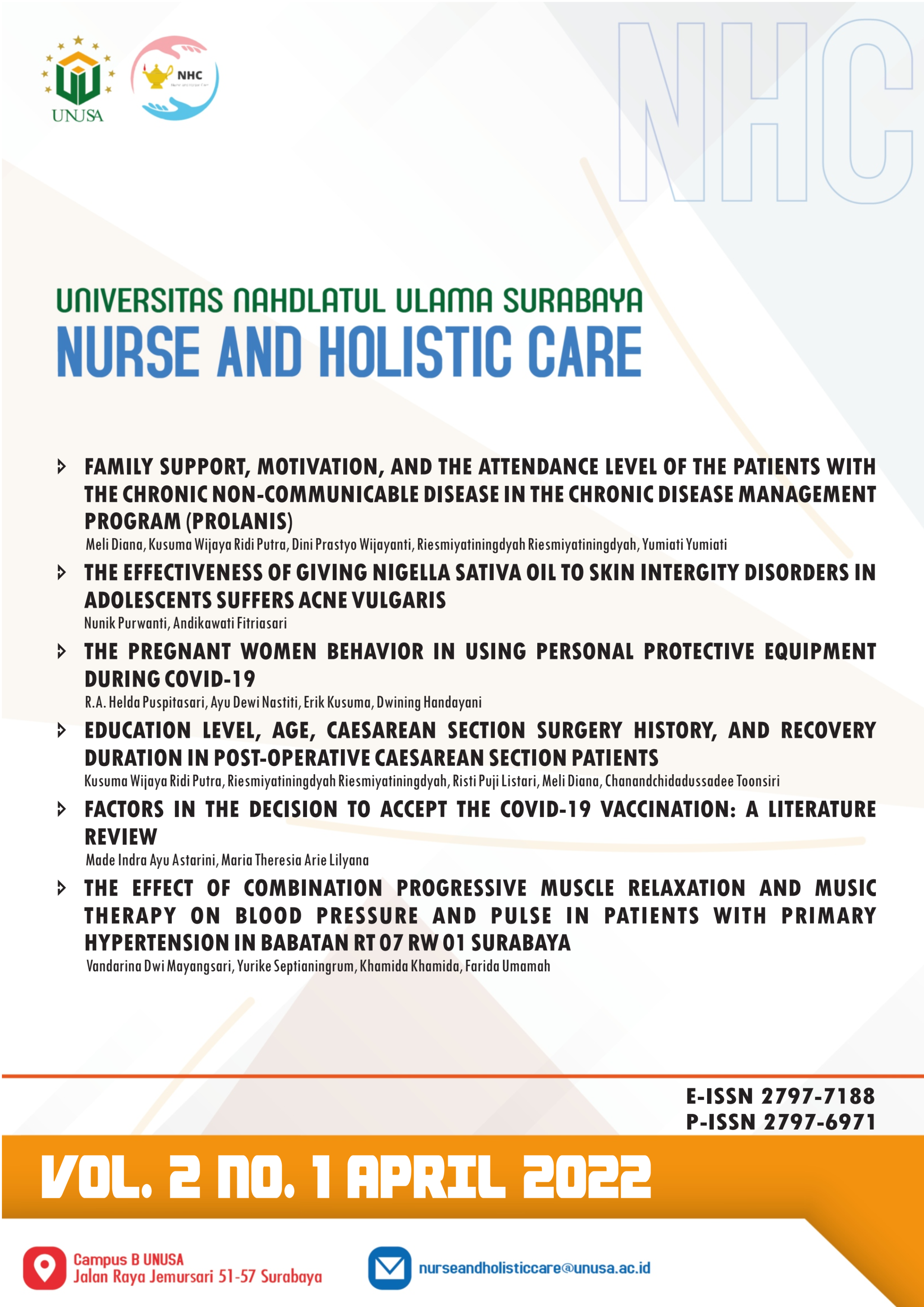FACTORS IN THE DECISION TO ACCEPT THE COVID-19 VACCINATION: A LITERATURE REVIEW
##plugins.themes.bootstrap3.article.main##
Abstract
Background: The COVID-19 vaccination program was an effort made to prevent the transmission of the COVID-19 virus. Various considerations arise when this program was implemented. Individual factors are one of the factors that influence the decision to receive a COVID-19 vaccination.
Objective: This literature review aims to review the factors related to the decision to receive the COVID-19 vaccination.
Methods: The design used was literature review with PICO criteria (Population: General public (adult), Intervention: there no Intervention just to know the correlation, Comparison: there no comparison, Outcome: factor that correlate with decision to accept COVID-19 vaccination. Other criteria is the method: quantitative study) The keywords in two languages. The keywords for articles in Indonesian are "vaksin covid-19", "keputusan", "menerima", "masyarakat", "faktor". The keywords for English articles are “Factor”, “Acceptence”, “Decision”, “Covid-19 vaccination”, “Community”. There was conducted through two databases, including: Google Scholar (479 articles in Indonesia), and Science Direct (217 articles). Articles limited from January 2020 to Mei 2022. Then the author re-sorted the articles according were free access and full text, in the form of original articles.
Results: There are 10 articles that appropriate with the criteria. Those articles are quantitative studies with a cross sectional approach. Based on the results of the article review, the authors found that there were factors related to the decision to receive the COVID-19 vaccination, namely knowledge, information about COVID-19, perception, education level, income, age, gender, and previous flu vaccine experience.
Conclusion: Factors related to the decision to receive COVID-19 vaccination, namely knowledge, information about COVID-19, perception, education level, income, age, gender, previous flu vaccine experience, and history of illness. These factors can be the basis for the government to achieve successful COVID-19 vaccination achievements.
Downloads
##plugins.themes.bootstrap3.article.details##
Copyright (c) 2022 Made Indra Ayu Astarini, Maria Theresia Arie Lilyana

This work is licensed under a Creative Commons Attribution-NonCommercial 4.0 International License.
Authors who publish with Nurse and Holistic Care agree to the following terms:
- Authors retain copyright licensed under a Creative Commons Attribution-NonCommercial 4.0 (CC BY-NC 4.0), which allows others to remix, tweak, and build upon the authors' work non-commercially, and although the others' new works must also acknowledge the authors and be non-commercial, they don't have to license their derivative works on the same terms.
- Authors are permitted and encouraged to post their work online (e.g., in institutional repositories or on their website) prior to and during the submission process, as it can lead to productive exchanges, as well as earlier and greater citation of published work (See The Effect of Open Access). Authors can archive pre-print and post-print or publisher's version/PDF.
References
Abu-Farha, R., Mukattash, T., Itani, R., Karout, S., Khojah, H. M. J., Abed Al-Mahmood, A., & Alzoubi, K. H. (2021). Willingness of Middle Eastern public to receive COVID-19 vaccines. Saudi Pharmaceutical Journal, 29(7), 734–739. https://doi.org/10.1016/j.jsps.2021.05.005
Akiful Haque, M. M., Rahman, M. L., Hossian, M., Matin, K. F., Nabi, M. H., Saha, S., Hasan, M., Manna, R. M., Barsha, S. Y., Hasan, S. M. R., Siddiquea, S. R., Rahman, M. A., Khan, M. A. S., Rashid, M. U., Hossain, M. A., & Hawlader, M. D. H. (2021). Acceptance of COVID-19 vaccine and its determinants: evidence from a large sample study in Bangladesh. Heliyon, 7(6). https://doi.org/10.1016/j.heliyon.2021.e07376
Al Naam, Y. A., Elsafi, S. H., Alkharraz, Z. S., Almaqati, T. N., Alomar, A. M., Al Balawi, I. A., Jebakumar, A. Z., Ghazwani, A. A., Almusabi, S. S., Albusaili, S., Mashwal, F. A., & Al Zahrani, E. M. (2022). Factors related to COVID-19 vaccine hesitancy in Saudi Arabia. Public Health in Practice, 3(December 2021), 100258. https://doi.org/10.1016/j.puhip.2022.100258
Azim, L. ode liaumin, Rahman, & Khalza, L. A. (2021). Penerimaan Masyarakat Terhadap Vaksin Covid-19 Berdasarkan Teori HEalth BElief Model Di Kecamatan Poasia Kota Kendari. Hospital Majapahit, 13(2), 129–141.
De Freitas, L., Basdeo, D., & Wang, H.-I. (2021). Public trust, information sources and vaccine willingness related to the COVID-19 pandemic in Trinidad and Tobago: an online cross-sectional survey. The Lancet Regional Health - Americas, 3, 100051. https://doi.org/10.1016/j.lana.2021.100051
Erawan, M. A. S. P., Zaid, Z., Pratondo, K., & Lestari, A. Y. (2021). Predicting Covid-19 Vaccination Intention: The Role of Health Belief Model of Muslim Societies in Yogyakarta. Al-Sihah: The Public Health Science Journal, 13(1), 36. https://doi.org/10.24252/al-sihah.v13i1.20647
Ichsan, D. S., Hafid, F., Ramadhan, K., & Taqwin, T. (2021). Determinan Kesediaan Masyarakat menerima Vaksinasi Covid-19 di Sulawesi Tengah. Poltekita : Jurnal Ilmu Kesehatan, 15(1), 1–11. https://doi.org/10.33860/jik.v15i1.430
Puspasari, A., & Achadi, A. (2021). Pendekatan health belief model untuk menganalisis penrimaan vaksinasi COVID-19 di Indonesia. 6(8), 6. https://jurnal.syntaxliterate.co.id/index.php/syntax-literate/article/view/3750/2314
Rachmadi, T., Rahayu, T. P., Waluyo, A., & Yuliyanto, W. (2021). Pemberian Vaksinasi COVID-19 Bagi Masyarakat Kelompok Petugas Pelayanan Publik di Kecamatan Buluspesantren. JURPIKAT (Jurnal Pengabdian Kepada Masyarakat), 2(2), 104–119. https://doi.org/10.37339/jurpikat.v2i2.643
Sanggu Dedu, B. S., Nuryani, A., & Hidayati Bunga, D. N. F. (2022). Hubungan Tingkat Pengetahuan Dengan Kesiapan Vaksinasi Covid-19 Pada Usia Produktif Di Desa Sukabungah. Jurnal Ayurveda Medistra, 4(1), 15–21. https://doi.org/10.51690/medistra-jurnal123.v4i1.50
Shariff, S. Z., Richard, L., Hwang, S. W., Kwong, J. C., Forchuk, C., Dosani, N., & Booth, R. (2022). COVID-19 vaccine coverage and factors associated with vaccine uptake among 23 247 adults with a recent history of homelessness in Ontario, Canada: a population-based cohort study. The Lancet Public Health, 7(4), e366–e377. https://doi.org/10.1016/s2468-2667(22)00037-8
Walsh, J. C., Comar, M., Folan, J., Williams, S., & Kola-Palmer, S. (2022). The psychological and behavioural correlates of COVID-19 vaccine hesitancy and resistance in Ireland and the UK. Acta Psychologica, 225(July 2021), 103550. https://doi.org/10.1016/j.actpsy.2022.103550
WHO. (2022). Share of people who received at least one dose of COVID-19 vaccine.
Wong, L. P., Alias, H., Wong, P. F., Lee, H. Y., & AbuBakar, S. (2020). The use of the health belief model to assess predictors of intent to receive the COVID-19 vaccine and willingness to pay. Human Vaccines and Immunotherapeutics, 16(9), 2204–2214. https://doi.org/10.1080/21645515.2020.1790279
Yuni, L., Misnaniarti, & Haerawati, I. (2021). Analisis penerimaan vaksinasi COVID-19 di kalangan masyarakat. Jurnal Kesehatan Masyarakat Khatulistiwa, 9(4), 195–204. https://doi.org/10.29406/jkmk.v9i4.3056

